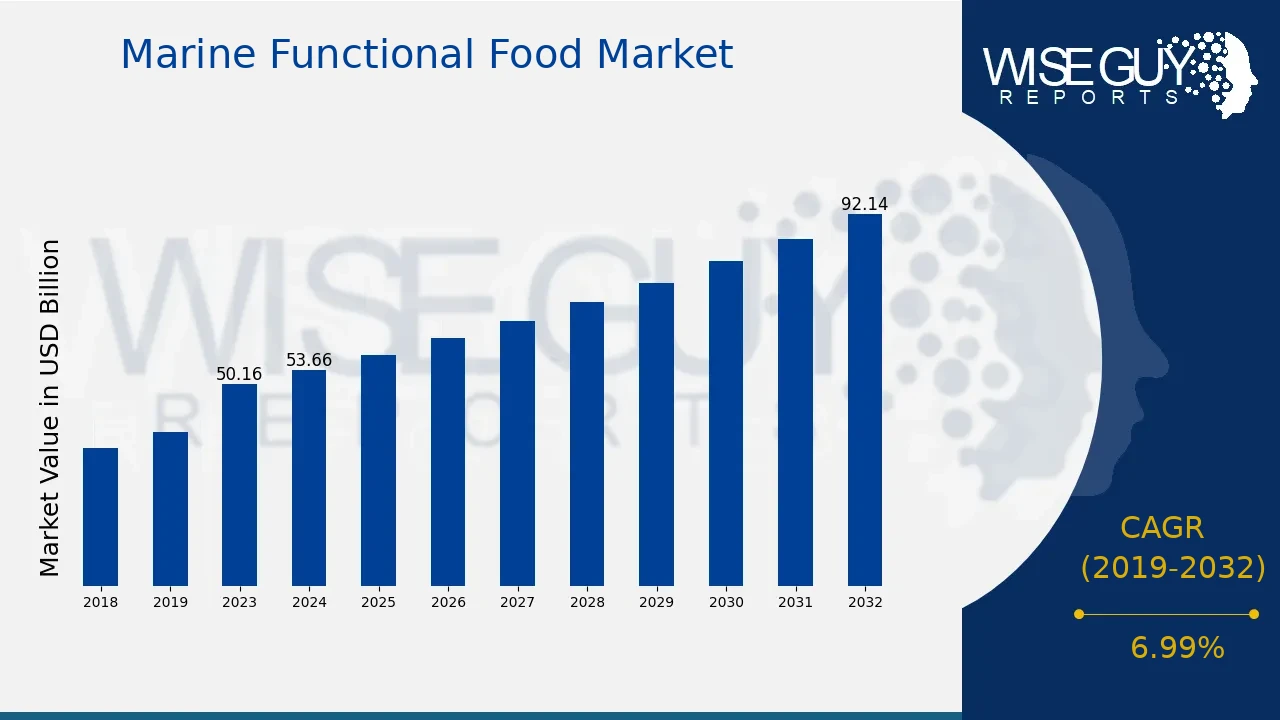The Marine Functional Food Market was valued at USD 50.16 billion in 2023 and is projected to increase from USD 53.66 billion in 2024 to USD 92.15 billion by 2032. This growth reflects a robust CAGR of 6.99% during the forecast period from 2024 to 2032.
The global marine functional food market is witnessing rapid growth, fueled by increasing consumer awareness of the health benefits associated with marine-derived nutrients. These products, sourced from fish, algae, shellfish, and other marine organisms, are gaining popularity for their rich content of omega-3 fatty acids, proteins, antioxidants, and minerals. As the demand for natural and health-enhancing food solutions rises, marine functional foods are emerging as a vital segment of the functional food industry.
According to the latest insights from WiseGuyReports, the market’s upward trajectory is supported by growing health-consciousness, advancements in marine biotechnology, and a steady expansion of applications in dietary supplements, fortified foods, and beverages.
Key Companies in the Marine Functional Food Market Include:
Arctic Blue Beverages ,Blue Ocean Nutra Products ,Cargill ,Chr. Hansen ,Corbion ,Dow ,DSM ,Fonterra ,Ingredion ,Kerry Group ,Koninklijke DSM ,Lonza Group ,PepsiCo, Inc. ,Vitafoods ,WhiteWave Foods
Request Free Sample - Obtain a complimentary sample of our report to assess its quality and relevance to your requirements: https://www.wiseguyreports.com/sample-request?id=553771
Global Growth Drivers
Several factors are driving the worldwide growth of the marine functional food market:
1. Increasing Lifestyle-Related Health Concerns: Rising cases of cardiovascular diseases, obesity, and nutrient deficiencies have prompted consumers to seek functional food solutions. Marine-based products, particularly those rich in omega-3s, are known to support heart health, brain function, and overall wellness.
2. Shift Toward Natural and Sustainable Sources: Modern consumers are moving away from synthetic supplements and processed ingredients. Marine functional foods offer a natural alternative, appealing to individuals who prioritize clean-label and eco-friendly products.
3. Government and Institutional Support: Health authorities in many countries are promoting dietary guidelines that emphasize omega-3 consumption, which is encouraging more research and market investment in marine-derived food ingredients.
4. Technological Advancements in Extraction and Processing: New extraction technologies are enabling higher yields and better preservation of bioactive compounds from marine resources, making these products more accessible and affordable.
Rising Demand Trends
The global demand for marine functional foods is expanding across multiple sectors:
Nutraceutical Supplements – Omega-3 capsules, algae-based DHA supplements, and marine collagen powders are becoming essential in health-conscious diets.
Fortified Foods & Beverages – Bakery products, dairy alternatives, sports drinks, and snacks enriched with marine-based nutrients are increasingly entering mainstream markets.
Elderly Nutrition – With an aging global population, there is a growing need for foods that support cognitive function, bone strength, and immune health.
Sports and Fitness Nutrition – Athletes and fitness enthusiasts are adopting marine proteins and peptides to enhance recovery and performance.
Current Market Trends
1. Algae as a Plant-Based Marine Alternative: While traditional marine functional foods come from fish and shellfish, algae is gaining traction as a vegan-friendly source of omega-3s, antioxidants, and minerals.
2. Marine Collagen Boom: The beauty and wellness industry has embraced marine collagen for its skin, hair, and joint health benefits, leading to product innovations in powders, gummies, and ready-to-drink beverages.
Browse Report - Explore the report's contents, sections, and key insights by browsing through its detailed information: https://www.wiseguyreports.com/reports/marine-functional-food-market
3. Sustainability and Ethical Sourcing: Companies are investing in eco-friendly harvesting and aquaculture practices to meet sustainability standards and appeal to environmentally conscious consumers.
4. Personalized Nutrition: Advances in health tech and genetic testing are allowing brands to offer personalized functional food solutions based on individual nutrient requirements.



